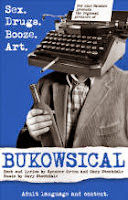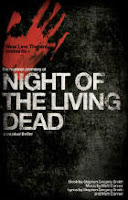Likewise, I sit here on New Year's Eve, thinking back and looking ahead. If you wanna get all Sondheimy about it, you might say I'm sorry to see 2013 go, but grateful for what's ahead in 2014.
2013 was a really wonderful year. We started in January with the first "adult cabaret" presented by New Line's new bastard child, New Line Theatre Off Line. Some Songs 'n' Shit starred Zak, Dowdy, and Taylor, with Justin on piano and Dowdy directing. It turned out really great and played to a sold-out house. It was cool to see how well the New Line aesthetic transfers to cabaret.
In March we opened Next to Normal, and I gotta say, it really scared me in a lot of ways. But I could not have been prouder of it. It turned out very different from the original, much more a ghost story. We assembled a cast of four of my favorite veteran New Liners, plus two new young actors, and I can't imagine a more perfect cast. It was also the first time Dowdy officially directed with me, and that worked out really well. Dowdy is such a fountain of ideas, and anytime we hit a problem, he had six ways to get around it. We'll be teamed up again for Rent.
Kimi and Jeff, as Diana and Dan in N2N, were simply extraordinary. Both of them can really conjure up powerful, raw emotion, both of them have wonderful pop-rock voices, and both of them were utterly fearless, emotionally and artistically.
Next to Normal was a hell of a fucking mountain to scale, but we did it. We got eleven rave reviews and several critics said our production was better than the national tour. They used words and phrases like, "nothing less than extraordinary," "superior," "brilliant," "affecting and thought-provoking," "inspired," "surprising and exceptional," "emotionally packed, captivating," and our favorite, "scorching intensity."
In June, we took one of those massive, crazy risks that only New Line would take, with the regional premiere of the R-rated Bukowsical. We knew it would offend some people and we knew it might not sell all that great. But New Line isn't here to make money; we're here to bring interesting, exciting, smart, musical theatre to our region. And it was such a fun adventure! The writers were really helpful and supportive, and totally open to a few changes I asked for. They came to see the show and were really pleased with it. I hope other companies will tackle it now. It's so smart and so insightful into the relationship between an artist's life and his work, but it's also incredibly R-rated, so it'd have to be a pretty brave company who'd tackle it...
I'll never forget hearing that score the first time – "What's that feeling you get when you're down on your luck and you're too drunk to fuck? Bukowsical!"
I knew we had to do this show.
If ever a role was written for Zak Farmer, The World's Most Versatile Actor, it was the role of Charles Bukowski, the alcoholic, sexaholic genius at the center of the insanity called Bukowsical. Zak found the exact right balance of funny and serious. His Bukowski was not just a cultural outsider; he was also an outsider in his own show, so decidedly not musical comedy, inside this frantic, wacky musical comedy.
Not everybody loved Bukowsical, but a lot of people really did. My favorite quote came from Steve Callahan, who reviewed our show for KDHX – “For twenty-two years Scott Miller and New Line have been zapping the St. Louis musical theatre scene with bolts of energy. Off-beat, eccentric, sometimes dark, often hilarious, occasionally outrageous and always fresh, New Line productions are for folks who have accepted the fact that Rogers and Hammerstein are actually dead. . . Folks will either see it as one of the most outrageously funny things ever staged, or it will offend every sense. (Or possibly both.)”
Exactly.
And then in October, we took another massive crazy risk, with a musical version – a serious musical version – of Night of the Living Dead. It had only ever been done once at a community theatre in Maryland, so in a lot of ways, it was untested. And it was one of those shows that we had to discover as we worked. There's really no other show at all like it, so we were forging new territory. How does a serious musical horror-thriller work onstage? This isn't operetta like Sweeney Todd. What are the rules here? Can it really be scary? Can it stand up to its source material?
But as we've done so many times over the past twenty-three years, we knew enough to just trust this material and follow where it led us. And the reviews were amazing.
Kevin Brackett wrote in ReviewSTL, "Writers Matt Conner and Stephen Gregory Smith have found a way to translate the classic horror story into music and lyrics that are just as terrifying and suspenseful as the original film. . . For fans of Romero’s work, you’ve never seen it like this – and it’s a must see. Expect to feel the tension and hopelessness fly off of the stage and into the seats, and hold on until morning.” Paul Friswold wrote in The Riverfront Times, "Director Scott Miller steadily ratcheted the tension, and then broke it all open with the single most harrowing moment to happen onstage in St. Louis this year.”
Richard Green wrote for TalkinBroadway.com, “If you can really stand pure psychological terror, you can proceed west for the stunning power of Night of the Living Dead.” Steve Allen of Stagedoor St. Louis called it “one of the most frightening evenings ever at a musical.” Lynn Venhaus wrote in the Belleville News-Democrat, “A sense of dread permeates New Line Theatre's Night of the Living Dead from the very beginning, a chilling and haunting work in both expected and unexpected ways. This is the stuff nightmares are made of – a serious musical adaptation of a landmark horror film that still resonates today. I've seen the original movie countless times and yet I jumped and screamed, such is the intensity of this live theatrical production.”
Yes, it really was scary. Though the baseball playoffs and World Series hurt ticket sales a bit, it was absolutely an artistic success. I was so proud of this show – I think all of us were. Judy Newmark named Night of the Living Dead the best small-scale musical of the year, in her year-end Judy Awards in the Post-Dispatch.
Looking ahead to 2014, I can't wait to work on all three shows that are coming up. But first, on January 25, Off Line presents its second adult cabaret, What the Hell Are We Doing Here?, starring Marcy Wiegert and Ryan Foizey, both of whom will be in Rent and Hands on a Hardbody. Like last year, Justin will music direct, and Dowdy will direct.
This Sunday we start work on Rent, and I've been playing through the score a lot. What a beautiful, brilliant show. I saw it on Broadway just after it moved uptown in 1996, and I saw the completely reimagined off Broadway revival in 2011. Both were thrilling.
I know exactly how I want to approach this show. Larson always said he wanted Rent to be a Hair for the 90s, and I've realized that's my way in, through the style of Hair (which I've directed three times over the years, and I've also written a book about it), rowdy, loose, spontaneous, wild, joyful, exuberant, insanely high energy. I dunno, maybe that doesn't sound all that different from the way everybody approaches the show, but I really think ours will have a fairly different vibe. I think Rent has acquired too much polish and convention over the years. I think the inherent rawness in its unpolished lyrics and music is part of what makes the show so visceral, so powerfully accessible, exactly like Hair.
When people who've never seen Hair ask me about it, I describe it this way: it's not really a show; it's an experience. Or as the hippies would have called it, a happening. That's really true. It's fundamentally different from every other musical in the way you experience it. And I think that's what Larson intended with Rent. But I think it's become too codified, too "set" today. Aside from the really wonderful off Broadway revival in 2011, it seems to me that most productions of Rent no longer feel sufficiently wild, dangerous, subversive, free. Larson wrote that Rent is about a community celebrating life even in the face of death. That's what I'm going for – a celebration of life.
And a celebration is wild.
In June, we'll open what may be my favorite new show of the last few years, Hands on a Hardbody. We've already cast it, and we have a killer cast, including a ton of New Line veterans. I love this music so much. And yes, we will actually have a truck onstage. To find out how, you'll have to read our set designer Rob's blog...
And then in October, to open our 24th season, we've already announced that we'll be doing Bonnie & Clyde, another show that I really love and can't wait to work on. And to answer the next question some of you will ask, auditions for Bonnie & Clyde will be in June.
I'm so fucking lucky. I get to work on the best, coolest, most interesting work coming out of the musical theatre today, with a bunch of exceptional, fearless theatre artists. Most incredibly, despite our often challenging, adult work, the people and institutions of this city have supported New Line so unwaveringly for the last twenty-three years. I am so grateful. I so love my job.
Thank you for reading this blog, for coming to see our shows, for interacting with us on Facebook and Twitter, for your contributions, and for trusting us. We will keep doing our very best for you. I promise.
It's been a great time off, but it will be really wonderful to be back in rehearsal...
Happy New Year!
Long Live the Musical!
Scott





















